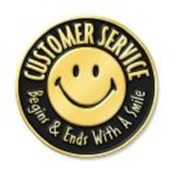|
 |
|
 |
|
|
||
Service-profit
chain
The service-profit chain is... The link showing how employee satisfaction leads to customer satisfaction and so higher profits i.e. happy employees mean happy customers. The concept first appeared in a 1994 Harvard Business Review article (see below) and is linked to the idea of internal customers.
Who are internal customers?
Employees supplied with goods and services by other employees in a chain ending with delivery to the paying customer.
How to satisfy employees to satisfy customers
1. Motivation i.e. employees putting in more effort to satisfy customers – how?
- so the organization's activities must be worthwhile, ethical and socially responsible.
2. Empowerment i.e. employees taking responsibility for work results and customer satisfaction – how?
- test every action with the question: ‘But does it help to sell our product?’.
3. Corporate culture All employees must believe in customer satisfaction and do all they can to put it into action.
4. Leadership and management Bosses and their managers must:
5. Systems (e.g. production) and organization structure These must help employees to satisfy customers. Some organizations think of their structure as an inverted pyramid with most importance given to employees in contact with customers (called front line employees)
Key quotes explained
“Treat customers like guests and employees like people” - Tom Peters , American management writer (pictured right) This is Peters’ formula for business success.
“People, service, profit” - the slogan of Fed Ex Express (formerly Federal Express), the American global delivery company. This is the central belief of the service-profit chain – put employees first, so that they can provide the best possible customer service that boosts profits. “We know that, if we treat our employees correctly, they’ll treat the customers right”, John Willard Marriott (the founder of Marriott hotels) said.
“The company can’t give job security only customers can” - Jack Welch (ex-boss of General Electric, pictured right) Even if employees are happy, they won’t keep their jobs, if they can’t satisfy customers. “The real and effectual discipline which is exercised over a workman is...that of his customers. It is the fear of losing their employment which restrains his frauds and corrects his negligence”, said the Scottish philosopher, Adam Smith.
Best books and articles
James Heskett (pictured right), Thomas Jones and Gary Loveman, Putting The Service-Profit Chain To Work (1994 Harvard Business Review article) The article that first introduced the idea of the service-profit chain.
Frederick Reichheld (pictured right), The Loyalty Effect (1996) The most profitable companies inspire loyalty amongst employees, customers and shareholders by developing long-term partnerships with them. Employee loyalty increases customer loyalty.
Valerie Zeithaml (pictured right top), A. Parasuraman (pictured right middle) and Leonard Berry(pictured right bottom), Delivering Quality Service (1990) Quality service is determined by RATER, five factors showing how vital employees are to customer satisfaction. We shall use McDonald's as an example: Reliability – delivering what was promised (e.g.100% beef hamburgers). Assurance – knowledgeable support from employees. Tangibles – physical facilities and equipment (e.g.
restaurants and staff appearance). Empathy – attentive understanding of customer problems. Responsiveness – helpful, prompt service.
|
|
|
||
|
|
||
| Copyright © wisdomtowin.com 2025 All Rights Reserved | ||
|















